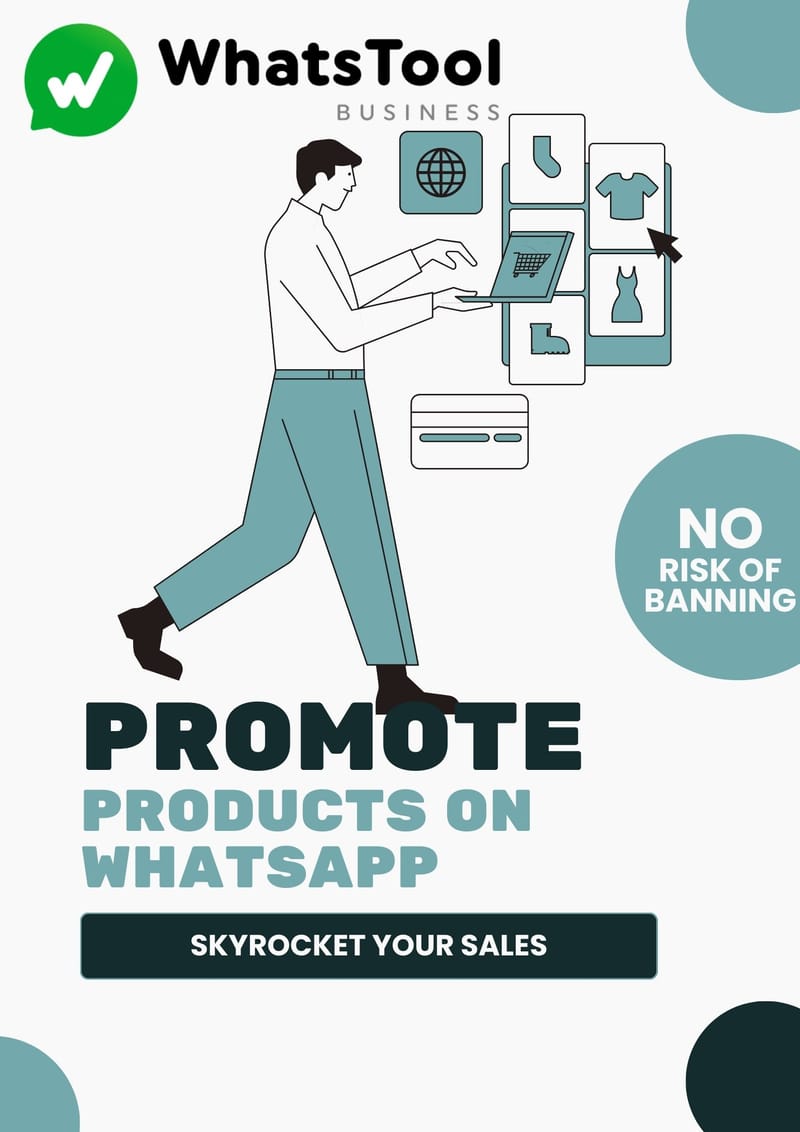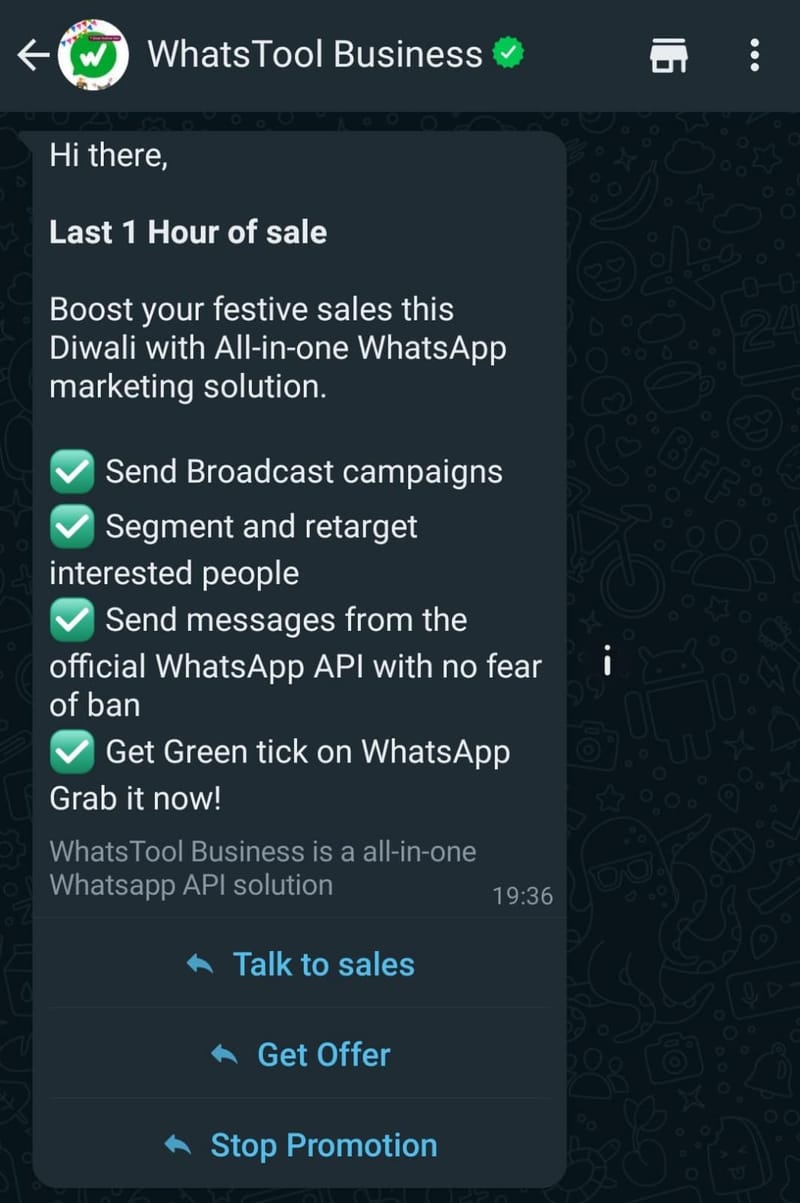Send promotional messages on WhatsApp through WhatsApp Business API

Sending promotional messages on WhatsApp through the WhatsApp Business API provides businesses with a direct and engaging communication channel to reach thousands of users. With high open rates and rich media support, businesses can create personalized and visually appealing promotions, fostering a more receptive audience. The real-time nature of WhatsApp enables timely communication, making it ideal for limited time offers and events. The global reach of WhatsApp allows businesses to connect with a diverse audience, and the opt-in nature ensures that messages are delivered to interested users. Additionally, the platform offers automation and analytics features, enabling businesses to streamline processes, track campaign performance, and enhance customer engagement, ultimately contributing to a more effective and efficient marketing strategy.
By using WhatsApp Business API-based platform like WhatsTool Business, you can broadcast promotional messages on WhatsApp without the risk of getting your number blocked by WhatsApp.
What are promotional messages on WhatsApp?
Promotional messages on WhatsApp refer to marketing communications sent by businesses to promote their products, services, or special offers directly to users on the platform. These messages aim to engage customers, drive sales, or increase brand awareness. To send promotional messages, businesses often use the WhatsApp Business API, ensuring compliance with WhatsApp's policies. These messages can include rich media content, such as images and videos, and are typically personalized to enhance user engagement. Successful promotional messages on WhatsApp leverage the platform's global reach, real-time capabilities, and the opt-in nature of user consent, providing businesses with a direct and effective channel for marketing and customer communication.

Were promotional messages on WhatsApp possible before?
Not really!
Before the introduction of the WhatsApp Business API, businesses could communicate with customers on WhatsApp, but the process was more limited and informal. WhatsApp initially focused on personal, one-on-one communication, and it was against the platform's terms of service to use regular WhatsApp accounts for bulk or automated messaging.
With the launch of the WhatsApp Business API, the landscape changed. The API allowed businesses to integrate WhatsApp into their communication and customer service systems more effectively. It introduced features such as message templates, business verification, and the ability to send messages at scale. This made it possible for businesses to send promotional messages in a structured and compliant manner.
Key Benefits of sending Promotional messages on WhatsApp
Sending promotional messages on WhatsApp can offer several key benefits for businesses, providing a unique and direct channel for marketing communication. Here's a more in-depth look at these advantages:
Direct and Personalized Communication:
WhatsApp enables businesses to establish direct communication with their customers. Through personalized messages, businesses can tailor content based on user preferences, previous interactions, and demographics, fostering a more meaningful connection.High Engagement Rates:
WhatsApp boasts high engagement rates, as users often check their messages promptly. This immediacy enhances the likelihood that promotional messages will be seen and acted upon, leading to increased customer engagement.Rich Media Support:
Promotional messages on WhatsApp can incorporate various media types, including images, videos, and documents. This rich media support allows businesses to create visually compelling and informative promotions, making their content more engaging and shareable.Real-Time Interaction:
The real-time nature of WhatsApp facilitates instant interaction. This is particularly beneficial for time-sensitive promotions, flash sales, or events where businesses can capitalize on users' immediate attention and response.Global Reach:
With a massive user base worldwide, WhatsApp provides businesses with a global reach. This is advantageous for international businesses or those seeking to expand their market presence, allowing them to connect with customers across different regions.Opt-In Audience:
Users must opt in to receive messages from businesses on WhatsApp, ensuring that promotional content is sent to a more receptive audience. This opt-in model enhances the quality of the audience and reduces the likelihood of messages being perceived as spam.Customer Support Integration:
In addition to promotions, WhatsApp can be used for customer support. Businesses can address inquiries, provide assistance, and resolve issues directly through the messaging platform, creating a seamless and convenient experience for customers.Analytics and Insights:
Some WhatsApp Business API platforms offer analytics tools, allowing businesses to track the performance of their promotional campaigns. Insights into user engagement, click-through rates, and other metrics provide valuable data for refining marketing strategies.Automation for Efficiency:
Automation features provided by the WhatsApp Business API like WhatsTool Business, enable businesses to streamline processes. This includes scheduling messages, setting up auto-replies, and automating certain aspects of customer interaction, improving efficiency and consistency.Compliance and User Trust:
Sending promotional messages through the WhatsApp Business API requires adherence to WhatsApp's policies. By respecting user privacy, obtaining explicit opt-in consent, and following guidelines, businesses can build trust with their audience, leading to more positive interactions and a better brand image.
Should you Broadcast Promotional Messages on WhatsApp?
Who Should Broadcast Promotional Messages:
Businesses with User Consent: Organizations that have obtained explicit opt-in consent from users to receive promotional messages can responsibly use the WhatsApp API for broadcasting.
Customer-Centric Brands: Businesses that prioritize customer experience and aim to provide valuable, relevant content to their audience through promotional messages can benefit from broadcasting on WhatsApp.
Compliant and Respectful Businesses: Entities that are committed to adhering to WhatsApp's policies, guidelines, and best practices, ensuring that their promotional broadcasts are respectful, non-intrusive, and compliant.
Those with Targeted and Relevant Content: Businesses that tailor their promotional messages to specific segments of their audience, ensuring that the content is relevant and valuable to the recipients.
Businesses Focused on Engagement: Organizations that aim to engage users with rich media content, interactive elements, and personalized messages to enhance the overall user experience.
Who Should Not Broadcast Promotional Messages:
Businesses without User Consent: Entities that have not obtained explicit permission or opt-in consent from users to receive promotional messages should refrain from broadcasting on WhatsApp, as it goes against WhatsApp's policies.
Spammers and Misusers: Individuals or businesses engaging in spamming activities, sending unsolicited messages, or violating WhatsApp's policies are strictly prohibited from using the WhatsApp API for promotional broadcasts.
Businesses with Irrelevant Content: Those who do not invest in creating relevant and valuable content for their audience may risk user disengagement and negative feedback.
Non-Compliant Businesses: Organizations that do not adhere to WhatsApp's guidelines, including those related to message templates, frequency limits, and content policies, should not use the WhatsApp API for broadcasting.
Businesses Ignoring Privacy Concerns: Entities that neglect user privacy concerns or fail to secure proper consent before sending promotional messages should avoid using WhatsApp for broadcasting.
Comments
Your comment has been submitted